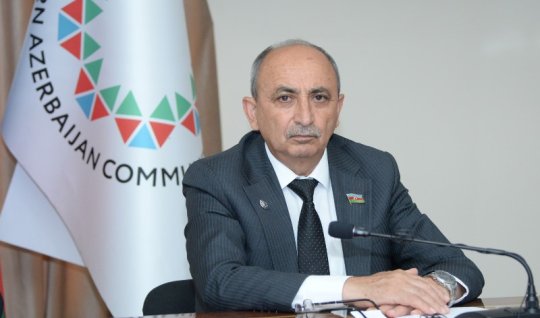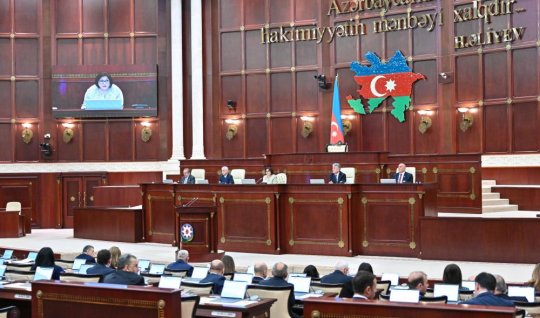Our tables dependent on foreign products - SEVERE WARNING

In recent years, the problem of food security has become one of the most serious challenges in the world. Against the backdrop of global warming, climate change, and a rapidly growing population, this issue does not only threaten poor or war-torn regions. Food security is a reality that concerns all countries. Therefore, every state is now obliged to consider what its citizens will put on the table tomorrow.
The situation is no different in Azerbaijan. The agricultural sector, the foundation of the country's food supply, is directly affected by these global processes. Although officials often voice optimistic figures, the observed decline in agriculture is a cause for concern. As Minister of Agriculture Majnun Mammadov noted, 9 billion 424 million manats worth of products were produced in January–August of this year, and this indicator is 0.8 percent less compared to the same period last year.
Although the Minister emphasized the importance of focusing on high-value sectors such as fruit growing, experts believe that the decline cannot be explained solely by structural changes. Issues of food security, sustainability of agricultural production, and export potential are now seriously on the agenda.
If we add that years ago a large part of Azerbaijan's revenues came from agriculture, we see a sad picture when looking at the current indicators.
Modern.az website has learned the opinions of **Vugar Bayramov**, a member of the Milli Majlis Committee on Economic Policy, Industry, and Entrepreneurship, economist **Natig Jafarli**, and agricultural expert **Vahid Maharramli** to understand the current situation, its causes, and solutions.
Import share in grain products is high

Deputy Vugar Bayramov stated that minimizing imports in the agricultural sector and meeting demand primarily through domestic production is currently one of the important priorities: “Figures show that a significant number of agricultural products are still imported into Azerbaijan. In particular, imports have a significant share in meeting the demand for wheat in Azerbaijan. This is due to the fact that some of the wheat grown in Azerbaijan is not used in the flour industry due to its quality. From this perspective, wheat is imported from Russia and Kazakhstan. However, it is naturally important to minimize imports. Undoubtedly, no country fully covers its agricultural product needs through local production. Certain products are imported in every country. But there is a need to increase the share of local production, especially in meeting the demand for strategically important products.”
The deputy suggests evaluating the effectiveness of agricultural subsidies: “Subsidies should directly stimulate the volume of production. Precisely for this reason, the allocation of subsidies should also be carried out in accordance with the production volume. There is a need to start using quality criteria in the provision of subsidies. On the other hand, it is necessary to increase farmers' access to financial reporting and expand educational activities among them. This is because, in some cases, farmers prioritize growing products that had high prices in previous years. Consequently, the production of some products increases, while others decrease. When there is overproduction, some of these products cannot be consumed. Therefore, education is very important. There is a need for teaching standards and education so that farmers can optimize production and thereby achieve the minimization of imports.”

V. Bayramov also noted that the demand for most garden products, tomatoes, eggs in poultry farming, and a number of fruits is fully met, and they are even exported.
Only 50 percent of food demand is met by domestic production
Expert Vahid Maharramli claims that studies show Azerbaijan can meet only 50% of its overall food product demand through domestic production:
“We produce wheat, but it is not food wheat. We mainly import food wheat. Since this product is of strategic importance, it is generally a key indicator in food supply. Wheat is not only used to produce flour. 32% of our meat demand is also met by domestic production. We import live animals from abroad. When these live animals are slaughtered domestically, this is also shown as domestic production. This brings the domestic production of meat demand to approximately 35-36 kilograms per capita. However, we do not raise and produce these live animals domestically. We merely carry out the slaughter. We also import frozen meat. Overall, per capita consumption in this area is currently 42-43 kilograms. But only 32 kilograms of this is from domestic production. The norm is 78 kilograms. Our indicator is 40% below the norm. We meet approximately 48-49% of our milk demand through domestic production. Sometimes dry milk is imported from abroad and shown here as domestic production. This refers to milk and dairy products in general. As for butter demand, we practically do not produce this product. Large quantities of butter are imported from abroad, packaged, and labeled here. Unfortunately, we do not fully supply ourselves with fruits and vegetables either.

If we look at the data from the State Customs Committee, imports in this area have significantly increased. We have the potential and conditions for fruit and vegetable production. We simply cannot utilize this potential. 90% of our sugar needs are met by raw materials imported from abroad. 90% of our vegetable oil demand is also imported. 80% of the required rice is also brought from abroad. Overall, our calculations show that we can meet only 50% of our demand in this area through domestic production. I am stating these figures considering the norm.
If we look at the data from the State Statistical Committee, it is possible to see that the figures there are high. The State Statistical Committee believes that if 42 or 45 kilograms of meat are consumed, somewhere around 70-80 percent of it is from domestic production. In reality, it should not be so.
The World Health Organization has established norms for people's physical condition. These norms are also confirmed by the FAO organization at the UN. The purchasing power of the population in our country is currently low; people cannot eat well and according to the norm. Not eating according to the norm is taken as a basis in international reports. Generally, unlike all other countries in the world, we do not adopt a norm. The figures shown in the minimum consumption basket are also not a norm. They are merely a threshold for calculating the minimum wage. This is the current situation."
The expert emphasized that the entire problem lies in management: "Among those holding high positions in the Ministry of Agriculture, there is not a single agricultural specialist. The Minister is unprofessional, one of the deputies is a lawyer with no connection to agriculture. The head of the apparatus is also a lawyer. There is not a single agronomist, zootechnician, soil scientist, or agrochemist. In such a situation, of course, agriculture cannot develop. They do not know what to do or how to do it. Azerbaijan must set a goal for itself to ensure its food security. For example, a plan should be prepared to produce 120 kilograms of food wheat, 78 kilograms of meat, 405 kilograms of milk, 309 eggs per capita, and so on. Accordingly, state programs should be implemented to determine what measures are needed to achieve this goal. Those in the Ministry are unprofessional and would not know this. We practically have no qualified personnel. Foot-and-mouth disease spread widely in the country. If we conduct research, we will see that other diseases have also spread. This was like a test showing that they are doing nothing."

V. Maharramli also touched upon the issue of meat: "In 2024, 31,200 kilograms of meat were imported from Pakistan at a price of 2 dollars 79 cents per kilogram. 10-15 years ago, meat was also imported from India. Old, and sometimes young, animals were brought from India. These meats are mainly used in public catering. This will not affect the prices of live animals slaughtered in slaughterhouses in the country. The origin of the imported meat is also known. So, Pakistan has 49 million cattle and 40 million buffaloes. Now, whoever goes there from Azerbaijan will, in any case, be oligarchs. They have a say in the market. We see that the quality of products imported from other countries is low. Low-quality meat was also brought from India. We are not sure that the animals imported from Pakistan will not be old buffalo meat. Let it be buffalo, or hip meat, but people should be able to eat according to their taste. It should simply be presented as it is, not as veal.
Of course, there is no p to control the individuals who will import the meat. Importers are people backed by high-ranking officials, and they dictate prices in the market. I do not believe there will be high-level pressure on them. Will any agency do anything? This is also impossible. They usually work by order; they are told to go and check a certain place, and they do. Azerbaijan should be encouraged to export meat, not import it. More meat production should be considered, and the government should stimulate this. The number of animals and those engaged in animal husbandry is decreasing. Our pastures have been occupied, and our hay production has decreased. All of these can be restored. It is enough for a professional specialist with knowledge and experience to manage this sector. A specialist knows this sector well and how to get out of the current situation.
This sector needs to be entrusted to those who understand it. Otherwise, we will not be able to revive agriculture. Agriculture is already ruined. We have repeatedly said that the appointment of unprofessional individuals to positions in agriculture leads this sector to collapse."
Self-sufficiency at 100 percent is not the goal

Economist Natig Jafarli, however, states that in an era of increasing global economic integration, it is not expedient to ensure 100 percent domestic production for every product: “Overall, if we look at food products, there is a 74 percent foreign dependency. But for some products, the situation is relatively good. For example, for products like meat, potatoes, onions, and apples, more than 80 percent of the supply is from domestic production. This is a quite good indicator.”
N. Jafarli believes that the production of profitable products with export potential should be increased, but this process must be based on natural economic laws: “The global economy is so integrated that trying to ensure every product through local production is inefficient. Our goal should be to maintain a 50-55 percent domestic supply level and increase exports of profitable products.”
-
00:47, Bu günIsrael was reportedly holding secret meetings with this country
-
00:31, Bu günWho do the Turks consider friends? – Azerbaijan is FIRST
-
7 December 2025, 23:51Ukrainians are rapidly leaving the country
-
7 December 2025, 23:40Syrians celebrated the overthrow of Bashar al-Assad - PHOTOS
-
7 December 2025, 22:31Israel will not allow Hamas!
-
7 December 2025, 21:21Hamas announced its main condition
-
7 December 2025, 19:50Volkan Demirel resigned
-
7 December 2025, 19:33Netanyahu will not leave politics
-
7 December 2025, 18:07Netanyahu wants to meet with Trump
-
7 December 2025, 15:41Russia has attacked Ukraine - casualties reported
-
7 December 2025, 15:28A new war hotbed in the world – danger increases
-
7 December 2025, 14:50China and Russia started joint missile exercises
-
7 December 2025, 13:26The Ukrainian army liberated this territory
-
7 December 2025, 12:15Trump awarded Hollywood stars - PHOTOS
-
7 December 2025, 11:41Accusation from China: Japan interfered with military exercises
-
7 December 2025, 09:24Fire at a nightclub in India - THERE ARE FATALITIES
-
6 December 2025, 22:40We have reached an agreement with America - ZELENSKY
-
6 December 2025, 21:40Armenia and Azerbaijan border guards have removed helmets and bulletproof vests - PASHINYAN
-
6 December 2025, 20:00Ukraine no longer believes in empty promises
-
6 December 2025, 19:20“I am a 'Grey Wolf' and I will die this way! - Bağçalı
-
6 December 2025, 17:32In Russia 1 percent of men “DISAPPEARED”
-
6 December 2025, 17:13Negotiations concerning Gaza are passing through a decisive stage
-
6 December 2025, 16:51Will Putin's arrest warrant be annulled?
-
6 December 2025, 14:22Turkey–Azerbaijan energy corridor will provide incredible benefits - US Ambassador
-
6 December 2025, 13:50Horrific accident in Turkey - 6 people DIED
-
6 December 2025, 12:48Second Chernobyl?
-
6 December 2025, 09:15Ukraine's Commander-in-Chief Opposed Territorial Concession
-
6 December 2025, 08:26Students in Germany protested - “We don't want to be soldiers”
-
5 December 2025, 22:15The resolution of the Ukraine conflict is imminent...
-
5 December 2025, 19:43Assad's allies are preparing for rebellion
























































